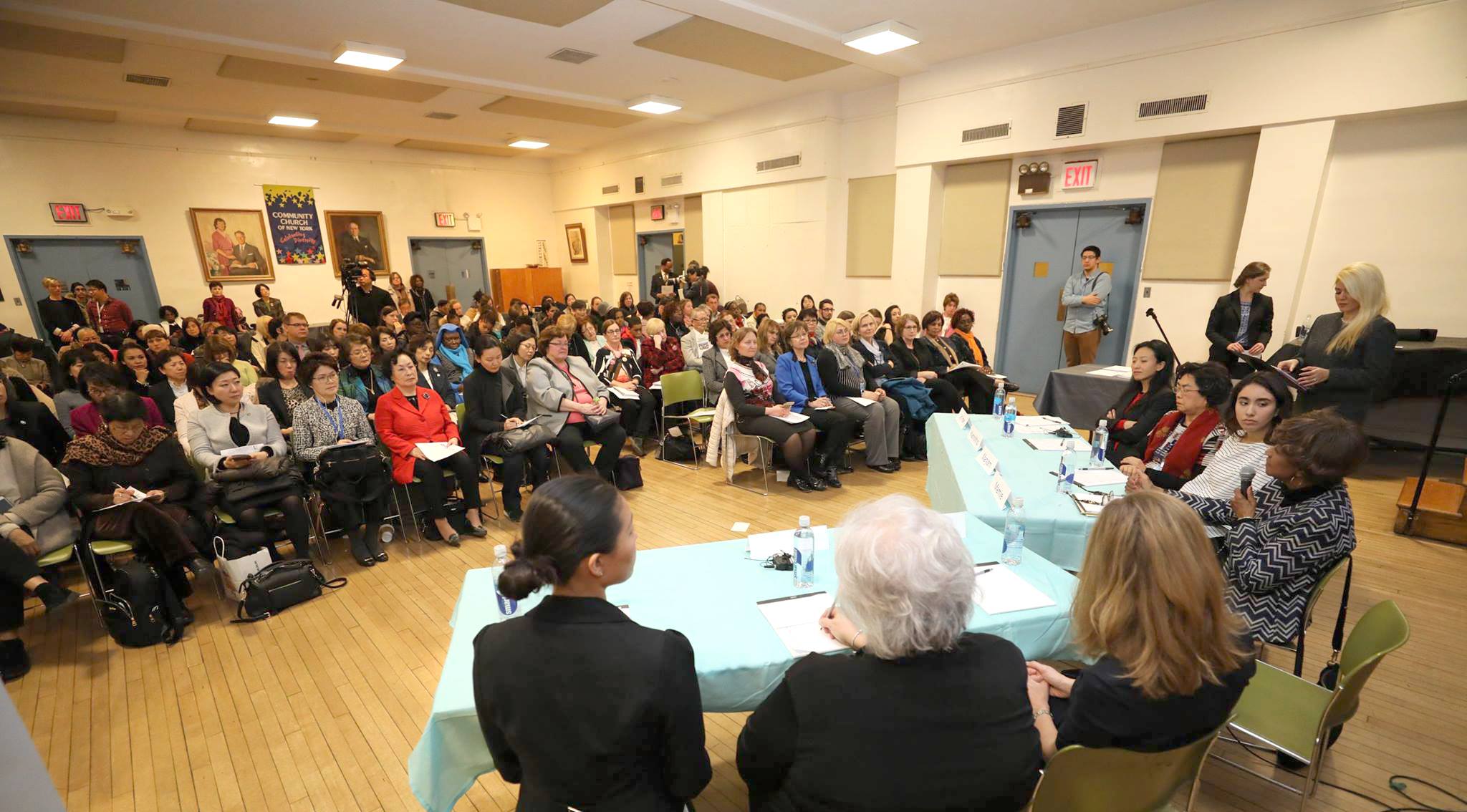CSW61 Parallel Event
Women Fostering Peace and Co-Prosperity: Creating Intergenerational Collaboration sans Arrogance
BY KRISTA SMITH, SUNGMI ORR, AND NADYA HINSON
MARCH 13, 2017 - COMMUNITY CHURCH OF NEW YORK
UN CSW61: WFWPI Parallel Event
The sixty-first session of the UN Commission on the Status of Women (CSW61), the primary intergovernmental forum for discussing gender equality and empowerment, took place in New York City this year from March 13 to 24. This annual event is attended by member states, UN entities, and global ECOSOC accredited non-governmental organizations, many of whom hold parallel events at locations throughout the city. WFWPI hosted its parallel event on March 13 in the Assembly Hall of the Community Church of New York with more than 200 guests in attendance, including students from the Macademy School of Science and Technology in Brooklyn, New York.
The process of conceptualizing and actualizing this theme was in itself an intergenerational collaboration with a team of women ranging from young adults, who had worked with WFWPI for less than a year, to core members who have been involved since the beginning of the organization 25 years ago. The young adult team included extensive contributions from co-chairs Roudabeh Jamshid Eini and Krista Smith, WFWPI Administrator Christina Lange, Jennifer Carroll, Dustin Knoblauch and Awele Ugele, with support from Jeanne Carroll, WFWPI representative to NGO CSW New York, and Alexa Ward, Director of WFWPI UN Office in New York. The team decided unanimously to create an event that would be set apart by candid honesty and an opportunity for discussion rather than a rehearsed or scripted presentation.
The event featured a panel of eight women representing a variety of professional backgrounds and ages. The discussants included: Jeanne Carroll; Mamie Thompson, international educator; Kamolthip Payakvichien, President of WFWP, Thailand; Jin Hee Kim, a senior attorney in Cravath's Corporate Department; Anastasia Vasilieva, an employee with Ernst & Young; Je-ok Presser, who works with NGOs concerning women's issues; and first-year college student Maryam Farooq, an advocate and youth volunteer.
The program was designed as a discussion with Roudabeh introducing and initiating three central questions to which the discussants responded in conversation, followed by questions from the audience. She opened with a warm greeting and words from the Co-Founder of WFWP, Dr. Hak Ja Han Moon. She cited words from the inaugural speech given by Dr. Moon in 1992, which petitioned women to take the lead in world peace centering on a mother's heart.
The first question posed to the panel concerned how to spread the feeling of sisterhood in the workplace, especially in light of the stereotypical tough, female boss. Each discussant contributed a unique perspective, with Kamolthip explaining the team-oriented structure of her organization and Anastasia emphasizing the importance of providing support groups for women within an organization.
The next question addressed how the discussants have been able to balance motherhood and their professional lives. Speaking from experience, Jin Hee emphasized the achievement of balance over time in seasons of life, whereas Mamie shared about including her children in housework as team members, and Anastasia expressed that sometimes it is important to "let the ball drop" as opposed to striving for unrealistic "balance."
The final question explored the culture and expectations of the older generation as opposed to the younger generation and potential strengths and weaknesses of each. The discussants agreed that there has been tremendous change for women in the workplace. Jeanne shared how her mother was one of many women who worked during the war effort of WWII, only to be sent home when the troops returned. Kamolthip elaborated on the intergenerational cooperation in her training program in Thailand as ancient farming practices are turned into sources of income. Maryam explained the importance of education in her family and that although her mother grew up without much education in Afghanistan, it is because of her that Maryam is pursuing a college degree.
Questions from the audience included how gender discrimination has changed, why "sans arrogance" was emphasized, and a young student asked how to address discrimination among his peers. The discussion was informative, inspirational, and thought provoking, concluding with a warm interlude for participants to network and take photos.



